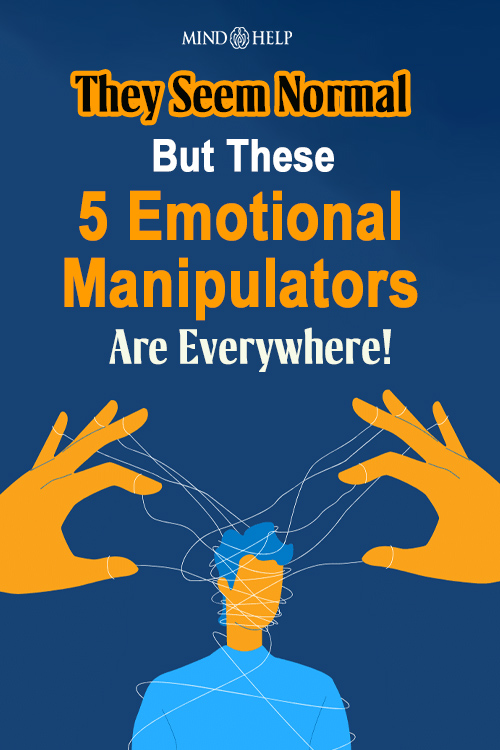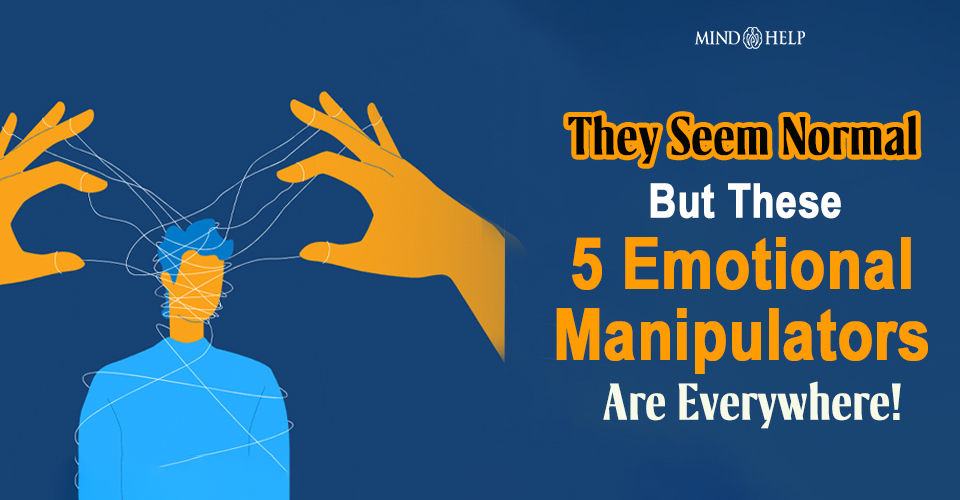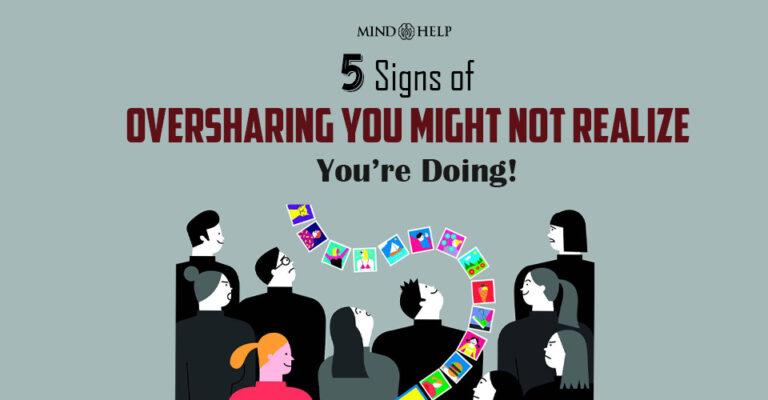If you’ve ever walked away from a conversation feeling foggy, guilty, or suddenly questioning your own memory—and only hours later thought, “Hold on… how did I somehow become the villain?”—you’ve definitely brushed up against emotional manipulators.
These individuals have a knack for twisting narratives, bending your words, and quietly steering your feelings until you’re left unsettled and second-guessing everything. And the tricky part? Emotional manipulators don’t always show up with dramatic flair. Some disguise control as charm. Others slip into helplessness so gracefully you end up apologising for things that weren’t even your fault.
Before you fall into that spiral again, let’s break down the subtle red flags in a person who doesn’t just communicate—they control. Ready to uncover the five types of emotional manipulators who tug at your emotions for their own gain?
The 5 Types of Emotional Manipulators You’ve Likely Encountered
1. The Projector
We all know someone who never lives up to their own advice but has no problem pointing out where you fall short. This is the projector’s signature move.
They’re experts at flipping the emotional script. If they’re being cold, suddenly you’re “the one who never cares.” If they explode, somehow you’re the one who “makes everything dramatic.” One of the classic signs of emotional manipulation is this ability to redirect blame, especially toward compassionate or conflict-avoidant people.
This type of manipulating behavior leaves you scrambling to defend yourself while they appear cool, collected, and completely unbothered. Meanwhile, you’re replaying the conversation like a detective piecing together evidence.
How to handle it:
Stay rooted in facts. A calm, grounded reply such as, “I hear you, but that’s not what actually happened,” stops the manipulation without fueling the fire.
Read: Anatomy Of A Manipulator: 10 Ways They Get In Your Head And Stay There
2. The Deliberate Mis-Interpreter
You say, “I could really use some help around the house,” and suddenly they accuse you of calling them lazy. You ask for five minutes alone, and they spiral into, “So I’m a burden now?”
Welcome to the land of the deliberate mis-interpreter—someone who doesn’t just misunderstand you; they choose to misunderstand you.
This is one of the clearest signs of emotional manipulation. They use misinterpretation as a weapon, turning neutral statements into personal insults. Before you know it, you’re defending words you never even said and apologizing for intentions you never had.
This cycle is exhausting and slowly erodes your confidence in your own communication.
How to handle it:
Their power thrives in confusion, so your strength is clarity. Try, “That’s not what I said or meant. If we can’t talk without twisting things, let’s pause this conversation.”
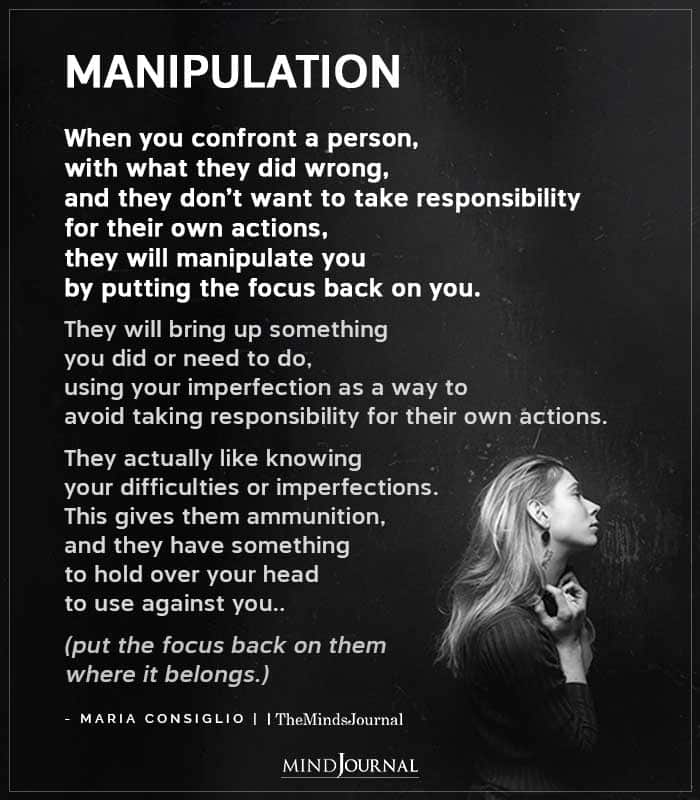
3. The Flirt
Not every manipulator arrives with criticism—some show up wrapped in charm. These flirts blur boundaries not by crossing them, but by making you want to lower them.
They know exactly how to make you feel special, understood, and seen. One moment they’re giving you the kind of attention that feels cinematic. The next? They pull away the second you ask for consistency, clarity, or commitment.
This emotional push-pull keeps you craving their warm side while tolerating behaviors you’d usually recognize as a red flag in a person. At first it feels intoxicating, not alarming. But over time, it becomes destabilizing.
How to handle it:
Ignore the sweet words—watch the patterns. Ask yourself, “Are their actions steady and genuine, or do they show affection only when it benefits them?”
4. The Iron Fist
This type doesn’t need charm or word games. Their power is in their silence, their tone, and the tension they bring into a room. The iron fist manipulates through quiet intimidation, not logic.
Maybe it’s a sudden cold shoulder, a sharp remark, or an energy shift that makes the atmosphere heavy. They don’t need to yell (though some might). It’s their controlled, simmering anger that does the work. Your body reacts out of instinct, and eventually, you start walking on eggshells to avoid setting them off.
This is manipulation through pressure—not persuasion.
How to handle it:
Your best defence is a steady boundary. Try, “I’m not comfortable continuing this conversation while you’re speaking to me this way. We can talk later.” It’s not confrontation—it’s protection.
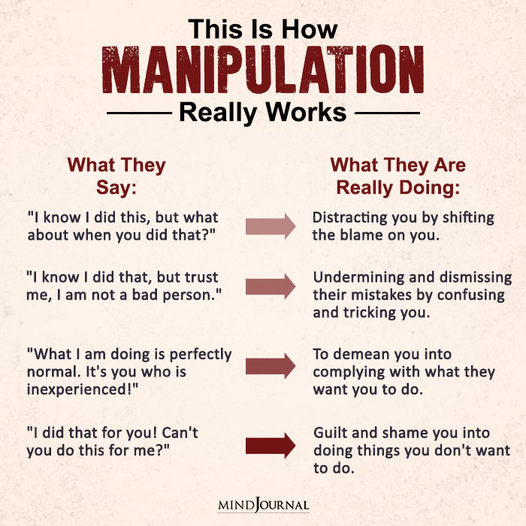
5. The Multiple Offender
If emotional manipulation were an Olympic event, this person would dominate every category. They don’t rely on one tactic—they rotate through several.
One day they’re incredibly charming. The next they’re fragile and wounded. The next they twist your words into something unrecognizable. Their inconsistency isn’t random—it’s part of the manipulation.
This type senses your patterns, then shifts theirs to keep you off balance. You end up decoding them constantly, unsure which version you’ll get. This unpredictability is one of the most draining red flags in a person, and it chips away at your emotional stability over time.
How to handle it:
Stop trying to figure them out. Their inconsistency is their consistency. If someone leaves you anxious, confused, or ungrounded, that alone is enough reason to step back.
Read: 8 Warning Signs of Emotional Exhaustion (And How to Recover)
Final Thoughts: You’re Not Overreacting—You’re Recognising the Pattern
If you leave someone feeling drained, uncertain, or confused, it’s not you being sensitive—it’s your intuition signaling that something’s off. Emotional manipulators rely on your uncertainty to keep control. Once you spot the tactic, you break the spell.
You deserve clarity, mutual respect, and relationships where your feelings aren’t treated like bargaining chips. You don’t need to decode someone’s mood before speaking. You don’t need to shrink to keep peace.
Healthy relationships feel steady. Boundaries are honoured. Emotional space is shared, not weaponised. And you deserve nothing less.
Frequently Asked Questions (FAQs)
How to deal with emotional manipulators?
When you spot emotional manipulation, pause and ground yourself. Set clear boundaries and gently stick to them. Don’t get pulled into guilt trips or drama; stay focused on what’s real. Share only what feels safe, and step back if someone keeps crossing your limits. Most importantly, trust your gut and lean on supportive people who help you stay centred.
How do you tell if someone is emotionally manipulating you?
Emotional manipulation often shows up as guilt trips, pressure, or conversations that leave you doubting yourself. If someone twists your words, shifts blame, or makes you feel responsible for their feelings, that’s a red flag. Notice how you feel after interacting with them: drained, confused, or tense. Your instincts are valuable. If something consistently feels “off,” it usually is.
How do I stop being emotionally manipulative?
Start by noticing when you use guilt, pressure, or silence to get what you want. Pause before reacting and name what you actually feel or need. Practice being direct, even if it feels awkward. Take responsibility when you slip up and apologise genuinely. Most importantly, stay curious about your triggers – self-awareness is what helps you break old patterns for good.
